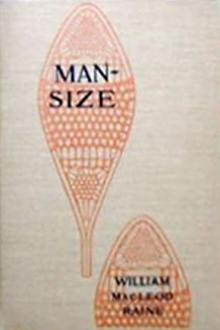Laughing Bill Hyde and Other Stories by Rex Beach (ebook smartphone .TXT) 📗

- Author: Rex Beach
Book online «Laughing Bill Hyde and Other Stories by Rex Beach (ebook smartphone .TXT) 📗». Author Rex Beach
With an effort he dismissed the subject from his mind and set himself to the more pleasant task of looking at his play through the eyes of the reviewers.
They had been very fair, he decided at last. Their only criticism was one which he had known to be inevitable, therefore he felt no resentment.
"Norma Berwynd was superb," he read; "she combined with rare beauty a personality at once bewitching and natural. She gave life to her lines; she was deep, intense, true; she rose to her emotional heights in a burst of power which electrified the audience. We cannot but wonder why such an artist has remained so long undiscovered."
The dramatist smiled; surely that was sufficient praise to compensate him for the miserable experience he had just undergone. He read further:
"Alas, that the same kind things cannot be said of Irving Francis, whose name is blazoned forth in letters of fire above the theater. He has established himself as one of America's brightest stars; but the rôle of John Danton does not enhance his reputation. In his lighter scenes he was delightful, but his emotional moments did not ring true. In the white-hot climax of the third act, for instance, which is the big scene of the play, he was stiff, unnatural, unconvincing. Either he saw Miss Berwynd taking the honors of stardom away from him and generously submerged his own talent in order to enhance her triumph, or it is but another proof of the statement that husband and wife do not make convincing lovers in the realm of the make-believe. It was surely due to no lack of opportunity on his part—"
So the writer thought Irving Francis had voluntarily allowed his wife to rival him. Phillips smiled at this. Some actors might be capable of such generosity, but hardly Irving Francis. He recalled the man's insistent demands during rehearsals that the 'script be changed to build up his own part and undermine that of his wife; the many heated arguments which had even threatened to prevent the final performance of the piece. Irving's egotism had blinded him to the true result of these quarrels, for although he had been given more lines, more scenes, Phillips had seen to it that Norma was the one to really profit by the changes. Author and star had been upon the verge of rupture more than once during that heartbreaking period of preparation, but Phillips was supremely glad now that he had held himself in control. Léontine's constant nagging had borne fruit, after all, in that it had at least taught him to bite down on his words, and to smile at provocation.
Yes! Norma Berwynd was a star in spite of herself, in spite of her husband. She was no longer merely the wife of Irving Francis, the popular idol. Phillips was glad that she did not know how long it had taken him to effect her independence, nor the price he had paid for it, since, under the circumstances, the truth could help neither of them.
He was aroused from his abstraction by the rustle of a woman's garments, and leaped to his feet with a glad light in his eyes, only to find Léontine, his wife, confronting him.
"Oh!" he said; then with an effort, "What is the matter?"
"Nothing."
"I didn't know you were coming down-town."
"Whom were you expecting?" Léontine mocked, with that slight accent which betrayed her Gallic origin.
"No one."
She regarded him with fixed hostility. "I came down to see your rehearsal. You don't object, I hope?"
"Why should I object?" Phillips turned away with a shrug. "I'm surprised, that's all—after what you said this morning. Isn't your interest in the play a trifle—tardy?"
"No! I've been greatly interested in it all the time. I read it several times in manuscript."
"Indeed! I didn't know that. It won't be much of a rehearsal this morning; I'm merely going to run over the third act with Mr. and Mrs. Francis."
"You can rehearse her forty years and she'll never play the part."
"The critics don't agree with you; they rave over her. If Francis himself—"
Mrs. Phillips uttered an exclamation of anger. "Oh, of course, she is perfect! You wouldn't give me the part, would you? No. You gave it to her. But it's mine by rights; I have the personality."
"I wrote it for her," said the husband, after a pause. "I can't see you in it."
"Naturally," she sneered. "Well, I can, and it's not too late to make the change. I'll replace her. My name will help the piece."
"Léontine!" he exclaimed, in amazement. "What are you talking about? The play is a tremendous success as it is, and Miss Berwynd is a big hit. I'd be crazy to make a change."
"You won't give me the part?"
"Certainly not. You shouldn't ask it."
"Doesn't Léontine Murat mean more to the public than Norma Berwynd?" she demanded.
"Until last night, yes. To-day—well, no. She has created this rôle.
Besides—you—couldn't play the part."
"And why not, if you please?"
"I don't want to hurt your feelings, Léontine."
"Go on!" she commanded, in a voice roughened by passion.
"In the first place you're not—young enough." The woman quivered. "In the second place, you've grown heavy. Then, too, your accent—"
She broke out at him furiously. "So! I'm old and fat and foreign. I've lost my beauty. You think so, eh? Well, other men don't. I'll show you what men think of me—"
"This is no time for threats," he interrupted, coldly.
"Bah! I don't threaten." Seizing him by the arm, she swung him about, for she was a large woman and still in the fullest vigor of her womanhood. "Listen! You can't fool me. I know why you wrote this play. I know why you took that girl and made a star of her. I've known the truth all along."
"You have no cause to—"
"Don't lie!" she stormed at him. "I can read you like a book. But I won't stand for it." She flung his arm violently from her and turned away.
"I think you'd better go home," he told her. "You'll have the stage hands talking in a minute."
She laughed disagreeably, ignoring his words. "I watched you write this play! I have eyes, even if Irving Francis is blind. It's time he knew what is going on."
"There is nothing going on," Phillips cried, heatedly; but his wife merely shrugged her splendid shoulders and, opening her gold vanity case, gave her face a deft going over with a tiny powder puff. After a time the man continued: "I could understand your attitude if you—cared for me, but some years ago you took pains to undeceive me on that point."
Léontine's lip curled, and she made no answer.
"This play is a fine piece of property; it will bring us a great deal of money; it is the thing for which I have worked years."
"I am going to tell Francis the truth about you and his wife!" she said.
"But there's nothing to tell," the man insisted, with an effort to restrain himself. "Besides, you must know the result if you start a thing like that. He'll walk out and take his wife with him. That would ruin—"
"Give me her part."
"I won't be coerced," he flared up, angrily. "You are willing to ruin me, out of pique, I suppose, but I won't permit it. This is the biggest thing I ever did, or ever will do, perhaps; it means honor and recognition, and—you're selfish enough to spoil it all. I've never spoken to Norma Berwynd in any way to which her husband or you could object. Therefore I resent your attitude."
"My attitude! I'm your wife."
He took a turn across the stage, followed by her eyes. Pausing before her at length, he said, quietly: "I've asked you to go home and now I insist upon it. If you are here when I return I shall dismiss the rehearsal. I refuse to allow our domestic relations to interfere with my business." He strode out to the front of the house and then paced the dark foyer, striving to master his emotions. A moment later he saw his wife leave the stage and assumed that she had obeyed his admonitions and gone home.
The property-man appeared with an armful of draperies and mechanical appliances, interrupting his whistling long enough to call out.
"Here's the new hangings, Mr. Phillips, and the Oriental rugs. I've got the dagger, too." He held a gleaming object on high. "Believe me, it's some Davy Crockett. There's a newspaper guy out back and he wants your ideas on the American drama. I told him they were great. Will you see him?"
"Not now. Tell him to come back later."
"Say! That John Danton is some character. Why don't you let him have the gal?"
"Because—well, because it doesn't happen in real life, and I've tried to make this play real, more than anything else."
When Norma Berwynd and her husband arrived Phillips had completely regained his composure, and he greeted them cordially. The woman seemed awed, half-frightened, by her sudden rise to fame. She seemed to be walking in a dream, and a great wonder dwelt in her eyes. As for Francis, he returned the author's greeting curtly, making it plain that he was in no agreeable temper.
"I congratulate you, Phillips," he said. "You and Norma have become famous overnight."
The open resentment in his tone angered the playwright and caused him to wonder if their long-deferred clash was destined to occur this morning. He knew himself to be overwrought, and he imagined Francis to be in no better frame of mind; nevertheless, he answered, pacifically:
"If that is so we owe it to your art."
"Not at all. I see now what I failed to detect in reading and rehearsing the piece, and what you neglected to tell me, namely, that this is a woman's play. There's nothing in it for me. There's nothing in my part."
"Oh, come now! The part is tremendous; you merely haven't got the most out of it as yet."
Francis drew himself up and eyed the speaker coldly. "You're quoting the newspapers. Pray be more original. You know, of course, how I stand with these penny-a-liners; they never have liked me, but as for the part—" He shrugged. "I can't get any more out of it than there is in it."
"Doubtless that was my fault at rehearsals. I've called this one so we can fix up the weak spot in the third act."
"Well! We're on time. Where are the others?" Francis cast an inquiring glance about.
"I'll only rehearse you and Mrs. Francis."
"Indeed!" The former speaker opened his mouth for a cutting rejoinder, but changed his mind and stalked away into the shadowy depths of the wings.
"Please make allowances for him," Norma begged, approaching Phillips in order that her words might not be overheard. "I've never seen him so broken up over anything. He is always unstrung after an opening, but he is—terrible, this morning."
There was trouble, timidity, and another indefinable expression in the woman's eyes as they followed the vanishing figure of her husband; faint lines appeared at the corners of her mouth, lines which had no place in the face of a happily married woman. She was trembling, moreover, as if she had but recently played some big, emotional rôle, and Phillips felt the old aching pity for her tugging at his heart. He wondered if those stories about Francis could be true.
"It has been a great strain on all of us," he told her. "But you? How do you feel after all this?" He indicated the pile of morning papers, and at sight of them her eyes suddenly filled with that same wonder and gladness he had noticed when she first arrived.
"Oh-h! I—I'm breathless. Something clutches me—here." She laid her hand upon





Comments (0)